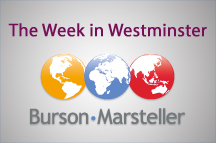 The government has, so far, survived the week without any Cabinet resignations or sexual harassment allegations, but has not taken the chance to relax. Instead the government has gone on the offensive. The fact is that for a government that is allegedly on its last legs and close to collapse it seems remarkably pugnacious, both at home and abroad.
The government has, so far, survived the week without any Cabinet resignations or sexual harassment allegations, but has not taken the chance to relax. Instead the government has gone on the offensive. The fact is that for a government that is allegedly on its last legs and close to collapse it seems remarkably pugnacious, both at home and abroad.
The biggest, most enduring battle of all is one that the government cannot get away from – Brexit. London and Brussels remain in tension. The end of the sixth round of Brexit talks brought no resolution on the question of whether Britain had shown enough leg on the budget to commence trade negotiations.
In Parliament, the government talked peace on Brexit but offered war with the promise of a vote on the eventual Brexit deal. There seemed to be surprise in some quarters that voting this deal down would mean leaving with no deal at all, with no option to remain in the EU. The only surprise is that anyone was surprised by this development, considering the huge practical and political obstacles to stopping Brexit in this manner.
Alongside this, conflict between the government and its own backbenchers escalated noticeably, with a full front page assault in the Daily Telegraph on the Conservative MPs supposedly betraying Brexit with their proposed amendments to the EU withdrawal Bill.
The biggest battles however, have been abroad. The government has lost two of three international-facing Cabinet ministers (defence and international development) in the last fortnight, and the third (the Foreign & Commonwealth Office) sits under a cloud, but this has not stopped the launch of a more activist foreign policy.
 Theresa May used her Annual speech at the Lord Mayor’s banquet to highlight the threats to international order, and named Russia as the chief of these. This was in sharp contrast to Trump’s comments only days before calling for better US-Russian relations. The speech was of course also a part of the Brexit battle – May stressing her solidarity with European countries such as Denmark, which have suffered Russian interference.
Theresa May used her Annual speech at the Lord Mayor’s banquet to highlight the threats to international order, and named Russia as the chief of these. This was in sharp contrast to Trump’s comments only days before calling for better US-Russian relations. The speech was of course also a part of the Brexit battle – May stressing her solidarity with European countries such as Denmark, which have suffered Russian interference.
At the same time the government also took a more active approach towards Iran over imprisonment of Nazanin Zaghari-Ratcliffe. There are newspaper reports that the dual British-Iranian national may be given diplomatic protection, with additional rumours that Britain may settle an outstanding debt from the 1970s, to the tune of a cool £400m.
Domestic party politics was certainly not free of conflicts, although here the action moved from Westminster to Kensington. For Labour this was meant to be the week to campaign on the issues raised as a result of the Grenfell tower block tragedy earlier this year, in particular pressing the government to fund sprinklers in tower blocks. This plan went awry, when Emma Dent Coad MP’s report into social divisions in her Kensington constituency, was overshadowed by revelations about racially-charged comments she had made about former Conservative candidate Shaun Bailey. Jeremy Corbyn said he would “have a word” with her, and in his own inimitable style, took the opportunity to condemn all offensive language.
Theresa May has started quite a few battles this week, but as every fighter knows, you can pick too many fights.














